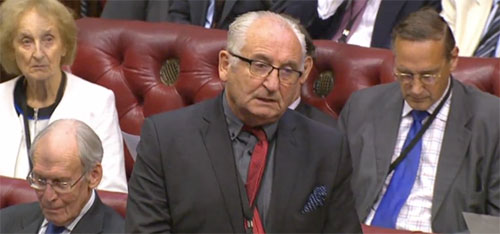Like me, le cuisinier français seemed to have made the most of their precious little. Likewise, I see myself as having made the most of my precious little. Always encountering the cleverer, the better- educated and the better-nurtured, I’ve tried to use what little education and skills I have to the greatest advantage.
That might sound downright arrogant – and forgive me if it offends – but when one is surrounded, especially in Parliament, by those incredibly advanced in culture and education, you have to realise that for all that dressing, and all that investment, it’s not enough. They’re often let down by their advantages and weakened because they don’t seem to make the most of little and therefore waste their plenty.
This is not, I assure you, a class slag-off. I have no problem with the well-appointed. My problem is that they seem to waste so much of their advantage on little more than crass thinking (or pensée grossière, as the French might say).
It seems that we live in a time when the meritocrats are yet to arrive (or have exited prematurely). The current political system seems cemented in keeping an ill-functioning regime going, where government budgets fail to tackle the causes and concentrate on effects. And the well-made and well-advantaged just buy into this crassness.
I’ve had to accept in the British class system is that the cleverly educated are not necessarily that clever
And a badly put together, poorly educated, badly socialised geezer like me – forgive again the self-promotion – asks about this Emperor’s-new-clothes of a scenario.
If only we lived in a meritocracy, we’d have lots of bright people who journeyed upwards from nothing to make the world function (and not default). We’d obviously have other problems with these meritocrats, but perhaps a meritocracy is preferable to a dumbocracy.
Advertising helps fund Big Issue’s mission to end poverty
You only need look at the Government’s budgetary spend to see that the money’s there, but that it’s allocated poorly by funding stops-gaps and short-termism, and not – as it should be – better allocated on pre-emption
and prevention.
I suppose the greatest realisation I’ve had to accept in the British class system is that the cleverly educated are not necessarily that clever. And that we suffer under their leadership in all walks of life. They have all the appearance, but all too little of the substance of leadership.
I am Mister 30 per cent. And I’m sure there are many like me, not brought fully formed into the world. But given our disadvantages, we cover far more than those piled high with educational and social privileges. If only there was more liberation for more of the 30 per centers, like me. Maybe ‘making the most out of the nothing’ argument could then make the world a better place.
Sorry, I very rarely crow. And if I sell my qualities to anyone, it’s normally to take the mickey out of myself. But I do believe that there is a natural intelligence that shines through me, and people like me, from what’s looked upon as the ‘below part’ of society. I’ve met so many who lack little more than hope, the chance, and then the opportunity.
French cuisine, if it’s been explained to me, made of the odds and ends and shows what can be done with incredibly little. And that the ‘laying on with the trowel’ of privilege produces the confederacy of dunces who run the world at
the moment.
Of course, it would be better if there wasn’t such a gigantic hole in the UK’s education systems where around 37 per cent of schoolchildren end up doing badly. Young people who then become the left-behinds and who rarely get out of need.
Advertising helps fund Big Issue’s mission to end poverty
It’s good that on some occasions us 30 per centers get out and get advance; but we should not be deliberately creating more of us. Better to spread the privilege less unevenly; better to tackle Britain’s ‘stagnating’ social immobility as the Social Mobility Commission recommended last week. That would be better for us all. Even the children of the privileged may find they get more out of their lives than the distortions of over-privilege.
Remember, poverty destroys us all in different ways. It makes the poor needy. And it makes of the privileged the exploiters; and their children often unable to bear the guilt.
Why do you think there are so many charities in the world? Guilt! But that’s another argument.








